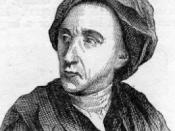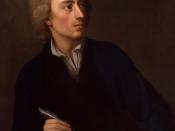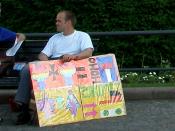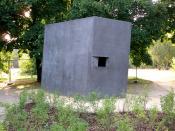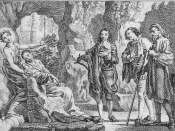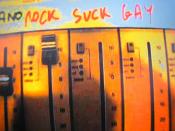Satirical writing was the dominant form during the restoration. Many great writers emerged from this period including Alexander Pope, John Milton, Jonathan Swift, and John Gay. There was a group of men called the scribblers club, which was a group of prominent writers who met at local coffee houses and talked about writing. These men were close friends who's writings allude to one another's while attacking others who try to contest with them. Probably the two closest friends were John Gay and Alexander Pope. But what sets John Gay apart from everyone else is that his works, which range from plays to articles for the paper, is that they are very witty and focus on comedy not form.
John Gay was born in 1688 at or near Barnstaple into a well established family who owned the manor of Goldworthy in Devonshire. His uncle was the head of a prestige's local school so John Gay was able to be educated there for free because his family was not wealthy enough to afford school.
Later he was sent to London and became an apprentice with a silk-mercer. He quickly realized that silk-mercer was not an occupation that would suit him well so he found a way to be let go. He later became the secretary for the duchess of Monmouth. During his job for Duchess of Monmouth he had more free time and began to publish poems. One of his first poem's published was about rural sports and was dedicated to Mr. Pope, Alexander Pope was an upcoming writer at the time. Pope was very honored by this gesture which enticed a friendship between the two which lasted until their deaths. "Gay is represented as a man easily incited to hope, and deeply depressed when his hopes were disappointed. This is not the character of a hero; but it may naturally imply something more generally welcome, a soft and civil companion. Whoever is apt to hope good from others is diligent to please them; but he that believes his powers strong enough to force their own way, commonly tries only to please himself." (11) At one point later in his life when he was well established as a writer, he got some insider information on stocks. This information was very inaccurate and he lost all of his money. Gay went into a deep depression that almost killed him. Pope and many other friends nursed him back to health in hopes Gay would write again which he did. The work he is most known for is The Beggars Opera which insulted the Italian opera in the form of a parody. The Beggars Opera not only is a parody but it was the first of its genre of ballad opera which ran for a record number of shows at a upcoming theater. Rich, a local theater owner, took on the play and as one stated, "of making Gay rich, and Rich gay." Gay was mainly a play write who's plays had jovinillian satire in them for instance The Beggar's Opera which only poked fun a the Italian opera with mild political reference.
In The Art of Walking the Streets of London, Gay is criticizing London's fast paced carnal life by giving a how to survival guide. In this parody John Gay gives warnings of brutal men, pickpockets, torch bearers, and even as specific as not to walk along the wall of Lincoln's Inn because the oil will rub off on your shirt or skirt. In line twelve he is warning Cynthia the chaste huntress of the gods to watch her head when she is walking the streets because of the shop signs hanging everywhere. Gay makes a comparison in lines forty through fifty about London men being just like pigs. He paints this picture of a man getting hit accidentally with a thong, a piece of leather to spur the horses, and the two men engage in a savage fight. Then he contrasts a pig fight being almost less violent but for a cause just as simple as the men. One thing that is brilliant is how he uses the wording for what the pigs are fighting for, "Dispute the reign of some luxurious mire." This to me exemplifies great tension between the words luxurious and mud which really emphasizes the absurdness of both fights from the outside looking in. In line one hundred forty five you can sense his frustration for the government and the law enforcers in his sarcasm, "Happy Augusta! Law-defended town!" What I especially like about that line is the reference to Augusta it really shows his education and as well his sarcasm is beautifully encompassed. Toward the end we have the only evident attack on a specific person which is Gay and Popes rivals, Ned Ward and Charles Giddon. Gay gives a very horathian blow by saying after these two rivals have died their writings will be used for bakery wrap. He also says their works will be used to make fire crackers. He then shows some arrogance by saying when the critics evaluate this piece of work and yours my will be the best.
On the surface this poem seems very light hearted and reminds me of our modern day Weird-Al Yancovich. But the second time I read the poem I interoperated a very frustrated undertone. He is criticizing the evil that happens in the streets of London and warning people about it, but he is really upset at the London government. I do not think he is horathian by attacking but his comical demeanor is just a cover. This piece of literature I found very important because it gave me insight to the everyday life of living in London during the restoration.
